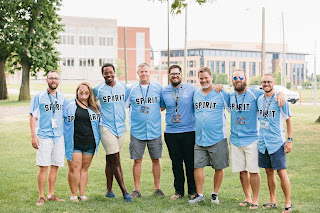Our Reality
Our Reality
originally published by the National Band Association, Georgia Chapter, September 2020
One of my favorite mottoes is,
“It is not your excuse, it is your reality.” It is a constant reminder
that we must always be solution-driven rather than problem-focused--this has
never been truer than now. As we return to school, we face various challenges;
some of us might be ill-prepared to handle. I know I am. Honestly, there were
times over the last five months. I was overwhelmed and feeling defeated by our
situation. Based on conversations with friends and colleagues, it became
apparent I was not alone.
"It is not your excuse, but it is your reality!"
This summer, while reading a leadership book, Extreme Ownership (Willink & Babin, 2017), written by two former Navy SEALs, a few ideas struck me. No, I am not planning on turning my students into Navy SEALS, but some of the best ideas/reminders can come from the most unlikely places. The first reminder was from a chapter entitled, Prioritize, and Execute. Willick and Babin suggest, when faced with an unexpected and possibly overwhelming problem, you must first prioritize your needs and then execute a plan to meet those needs. A simple concept I already knew. For me, a giant facepalm moment. I was focusing on the magnitude of the problem ahead; instead, I needed to break it down to essential student needs and then build the plan.

From the chapter Simple. From the chapter Simple, Willick and Babin remind us more problems arise in complicated plans than simple ones. The old KISS—Keep It Simple Stupid—Principle, which has been around a long time with me being the “Stupid” in this situation. Our process last spring had too many moving parts and the outcome was as Willick and Babin predicted. The final reminder was, ultimately, we must take ownership of everything occurring in our classrooms, either face-to-face or online. Taking ultimate responsibility can be a tough one, but it is our most important reality.

These facepalm moments helped me begin to reflect on what went wrong with the shutdown and what our students needed this semester. Most importantly, we needed to simplify the access to technology and invest time in helping them understand the technology, something we did poorly in March. This year, we reduced the number of apps for the students and are currently only using FlipGrid—for those who do not know, it is a commonly used video app our students use in other classes. We will be adding SmartMusic, Sightreadingfactory.com, and possibly some others over the semester. We have already introduced small assignments using FlipGrid to orientate our students with the technology moving forward.
As in our classrooms, students need structure. We also found our students need a consistent online structure, which was something we did poorly in March. This year, we place all our weekly activities into one place with a clear to-do list for the week. Keeping the tasks simple with concise instructions is essential. We also realized our students missed the social-emotional connection in a band, and we are committed to regular activities to help reconnect with our students. So far, we have started with some self-assessments of what they need and discussions about life in quarantine. We are off to a great start.
Students at South Forsyth Middle School have a choice between virtual and face-to-face instruction. Currently, we do not have access to our virtual students, which is something we are trying to correct. For our face-to-face students, we prioritized reviewing fundamentals from the long layoff, reestablishing rapport, and taking advantage of the smaller class sizes to target instruction. We will use flex-band arrangements as well as chamber music to get them making music quickly. The act of playing songs and music is essential to reignite that spark and joy in the students. Hopefully, we will be able to perform soon, but we will be using live-streaming technology and video recording until we can hold regular concerts. Remember, our students want to perform.
"We do not practice to practice. We practice so we can perform!"
In closing, as we prepare for the challenging days ahead, I am constantly reminded of why I love what we do. That spark in a student’s eye when making music is magical, regardless of whether it is over a computer screen or in person. Watching students grow on their yearly musical journey over multiple years is a reward few other teachers enjoy. We are fortunate, and I remind myself daily of this opportunity. Our band community is healthy and vibrant, and we will be resilient in these difficult times. Remember, you are not alone. Many solutions are a phone call or Zoom meeting away. We are solution-driven, and with your creativity and connecting with colleagues, you will find your answers. Remain focused on your student’s needs and then create simple, concise plans to help lead them this year.
Most importantly, we must let go of what was and embrace the now. Personally, my anxiety elevates when I focus on the past or possible future challenges. Our students need us now more than ever, and they need music in their lives. By being present to our students, we will find the answers we need. When you let go and view students with fresh eyes and ears, you better assist them along this unique educational and musical journey.
Hang in there. Work the problem to find the solution. Keep it simple. Prioritize their needs. Seek help. Be creative and flexible. Make music with great joy. Our students need us!
Bibliography
Willink,
J., & Babin, L. (2017). Extreme Ownership: How US Navy SEALs Lead and
Win. Manhattan: St Martins Press.







Comments
Post a Comment